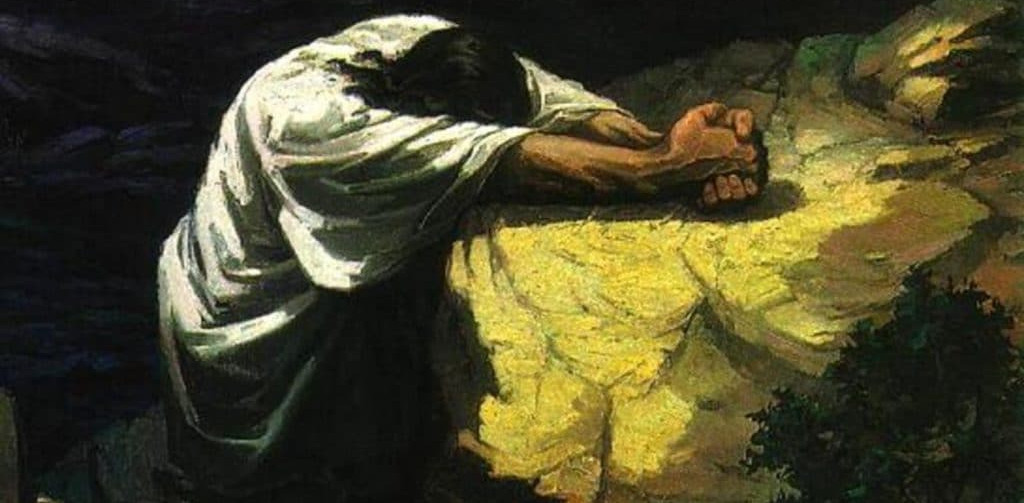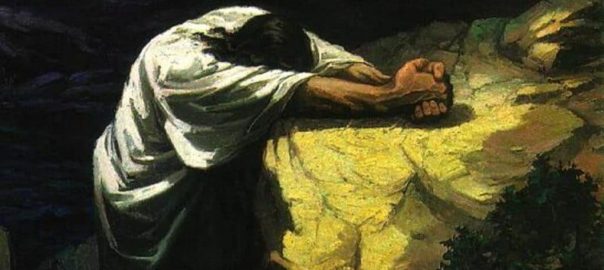Below is a guest post by David Moffatt. The author takes sole responsibility for the views expressed here. Thanks to David for his thoughts on the meaning of the phrase “the heart of the earth”.

Christians down through history have wondered about the death of Jesus Christ, the Son of God begotten by the Holy Spirit. Specifically, I think some have puzzled over the idea that if He was both divine and human in nature and divinity is not subject to mortality, how it was possible for Him to die. I once asked a pastor/theologian/author I greatly respected about this and all he would venture was that we do not know but that somehow Christ’s divinity was hidden on the cross.
In thinking about this, I wonder if Christ gave us some clues that we can consider to give some insight into His death. One of these hints pertains to Christ’s reference to the prophet Jonah in which He said, ’For as Jonah was three days and three nights in the belly of the great fish, so will the Son of Man will be three days and three nights in the heart of the earth.’ (Matt 12:40).
I think the key to appreciating what Christ meant lies in the interpretation of His cryptic phrase ‘in the heart of the earth’. Most people make the assumption that it means in the grave. What if Christ meant something else?
The first Adam, the first human being, was our physical progenitor, and the last Adam, which the Bible tells us is Jesus Christ, is our spiritual one. The first Adam, as you know, was fashioned from the dust of the earth and the breath of God. The Hebrew word translated as ‘Adam’ can mean husband, man, mankind or ‘ruddy’ (earth often has a reddish appearance likened to Adam’s reddish skin). One lexicon actually equates one meaning of the word Adam with ‘the red earth’.
Thus, the name Adam (which Paul applies to Christ) is strongly associated with and links together the earth and humanity.
We were all created sinless in the first Adam. When he fell into sin he lost his immortality and became subject to death. I believe Romans 5 says that we fell in Him and his sin has resulted in his and our mortality. The weakness resulting from our mortality inevitably leads us to sin (Rom 5:12). (But even this death sentence will someday end in a blessing from God as sin will not remain forever but our lessons learned from it will.)
Jesus, like the first Adam, had a divine ‘parent’ and an earthly one. However, unlike the first Adam, never having sinned, He enjoyed unbroken communion with His Heavenly Father. He said such things as He and the Father were one, He only did what He saw the Father doing, and He did not seek His own will but the will of Him by whom He was sent.
There are many theories about what happened on the cross. I believe that just as we were all created before sin in the first Adam, we were all placed in the last Adam and carried through our death (the penalty for our sin) on the cross in Him. Paul wrote that we have died to the law through the body of Christ, we have been released from the law having died to that by which we were bound, we were buried with Christ through baptism to rise in newness of life, we were united with Him in the likeness of His death, and of course his famous statement, ‘I have been crucified with Christ; and it is no longer I who live, but Christ lives in me’.
Thus, it seems to me that in the plan of God, whomever He placed us into, whomever was to be our ‘carrier’ (be it the first or last Adam) had to be truly our representative, or just as we are.Then it follows that what Christ was referring to by His descent into ‘the heart of the earth’ did not mean the grave but rather into our fully human, ‘Adamic’ existence.
Hence, in the Garden of Gethsemane on Maundy Thursday, for our ultimate benefit, He gave up His divinity. His agonizing struggle at that time (sweating drops of blood) was about entering into a reality more distant from God and into a state He had never been, that of fallen humanity. That was a necessary step in order for us to be ‘in Him’ so He could carry us through our death on the cross. That is why He said at that time that His will (human survival instinct) now diverged from His Father’s will (‘Not my will but Thy will be done’). Hebrews 2:9 says that Jesus is ‘…now crowned with glory and honour because he suffered death, so that by the grace of God he might taste death for everyone.’ I see this passage as implying that he went through our human death.
In Mark 2:10, Jesus said He had authority on earth to forgive sins. Yet, on the cross He did not say ‘I forgive you…’ but He petitioned the Father (much as I hope we would, and the mortal Stephen in fact did in Acts 7:60) with ‘Father, forgive them…’ Does this not imply that Christ had relinquished His divine ability to forgive sin?
He also likened this phase of His life to Jonah’s time in the great fish. Jonah was not dead (at least not for the entire time) but rendered powerless, unable to do anything to save himself or remedy the situation. Christ was in a similar situation, having lost the perception (‘My God, My God, why have you forsaken me?’) and power inherent in divinity and now totally dependent on the Father to rescue Him, as you or I would have been.
In the Israelite OT celebration, the Passover lamb was killed on Nisan 14, the annual Passover Sabbath was on Nisan 15 and the Offering of First Fruits occurred on Nisan 16. In the year of Christ’s death, I believe he was crucified on Nisan 14 (which we now call Friday), the weekly and annual Passover Sabbaths coincided on Nisan 15 (our Saturday) and He was resurrected and presented as the first fruits from the dead (1Cor 15:23) in heaven on Nisan 16 (Sunday). This strikes me as the correct view because both the prophetic events and their timing fulfill the OT types exactly. One cannot reconcile the idea that He was dead for three days and three nights with the timing of this scenario because only two nights are involved.
However, if one uses the Hebrew concept of inclusive reckoning (that any part of a day or night however small counts as one in the total) from His struggle in the garden on Thursday to Sunday morning could be reckoned as three days and three nights. In my country, at Easter we treat both Good Friday and Easter Monday as religious holidays. I think this is because if you assume three days and nights from Christ’s death on Friday, His resurrection must get pushed back into Monday. I don’t believe this is necessary or correct.
When all is said and done what difference does this alternative understanding of Christ’s comment make? Paul tells us that God’s judgments are unsearchable and His ways unfathomable so, at least in this present age there is much about the plan of salvation we don’t comprehend. Hence, I believe it is a mistake to insist that one’s opinion about debatable things is the correct one.
But to me, the intense struggle Christ underwent in the garden to enter this unknown state of existence farther from the Father than He had ever been, and to battle his own will and then overcome his human instinct for survival for our salvation gives us further insight into the wondrous depth of our Saviour’s love for us.
